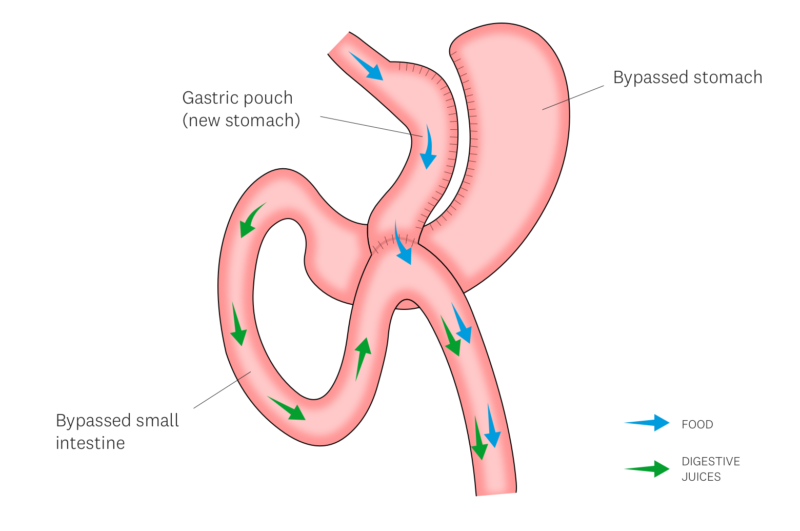The one Anastomosis gastric bypass is also called the mini gastric bypass or single anastomosis gastric bypass.
This involves the creation of a new stomach (from your original stomach) and joining a loop of small bowel to the new stomach. Food and fluid bypasses the original stomach and part of the small bowel.

Weight loss occurs due to a restriction in oral intake, malabsorption of nutrients, and alterations to the actions of gut hormones on the bowel.
On average, you will lose between 60-80% of your excess weight.
Some of the specific complications of laparoscopic one anastomosis gastric bypass include:
- Anastomotic leak (1-2%) – stomach fluid may leak out into the abdomen at the join created during this procedure, due to failure of the join to heal. This may require further procedures and an extended hospital stay.
- Marginal ulceration – this is an erosion/ulcer of the small bowel joined to the gastric pouch, similar to a stomach ulcer. This may cause pain in the upper abdomen or chest. Most times this can be treated with medications but occasionally, this requires further surgery.
- Stomal Stenosis – a narrowing at the join between stomach and small bowel. You may develop vomiting and rapid weight loss, due to inability of food and/or fluids to pass through the narrowed area. This can be treated by stretching the narrowing up with a balloon, or placement of a stent (tube), and removing it 4 weeks later. Occasionally, this requires revisional surgery.
- Stomal dilation – a widening at the join between stomach and small bowel. You may feel loss of restriction and be able to eat more. This may require further surgery.
- Internal Hernia (<1%) – bowel may get trapped in a space created during the formation of the gastric bypass. This may cause a blockage of the small bowel (obstruction) or lead to a lack of blood supply to the small bowel (strangulation). This is an emergency. You must go to your local hospital immediately if you have significant abdominal pain lasting more than one hour.
- Bile reflux (<1%) – bile (fluid produced by the liver to help in digestion of fatty foods) may go up the oesophagus and cause symptoms similar to that of acid reflux/heartburn. The use of medications is helpful. This may require further surgery.
- Dumping syndrome – a cluster of symptoms including Nausea/vomiting, rapid heartbeat, sweating, flushing, light-headedness, abdominal cramps, and diarrhoea. This is due to eating too much or eating foods high in sugar. This can be fixed by modifying your eating habits.
- Nutritional deficiencies – even though you will need to take multivitamins, you can become low in certain vitamins or minerals. Additional supplementation may be necessary. You will require lifelong follow-up and blood tests to monitor for potential deficiencies.